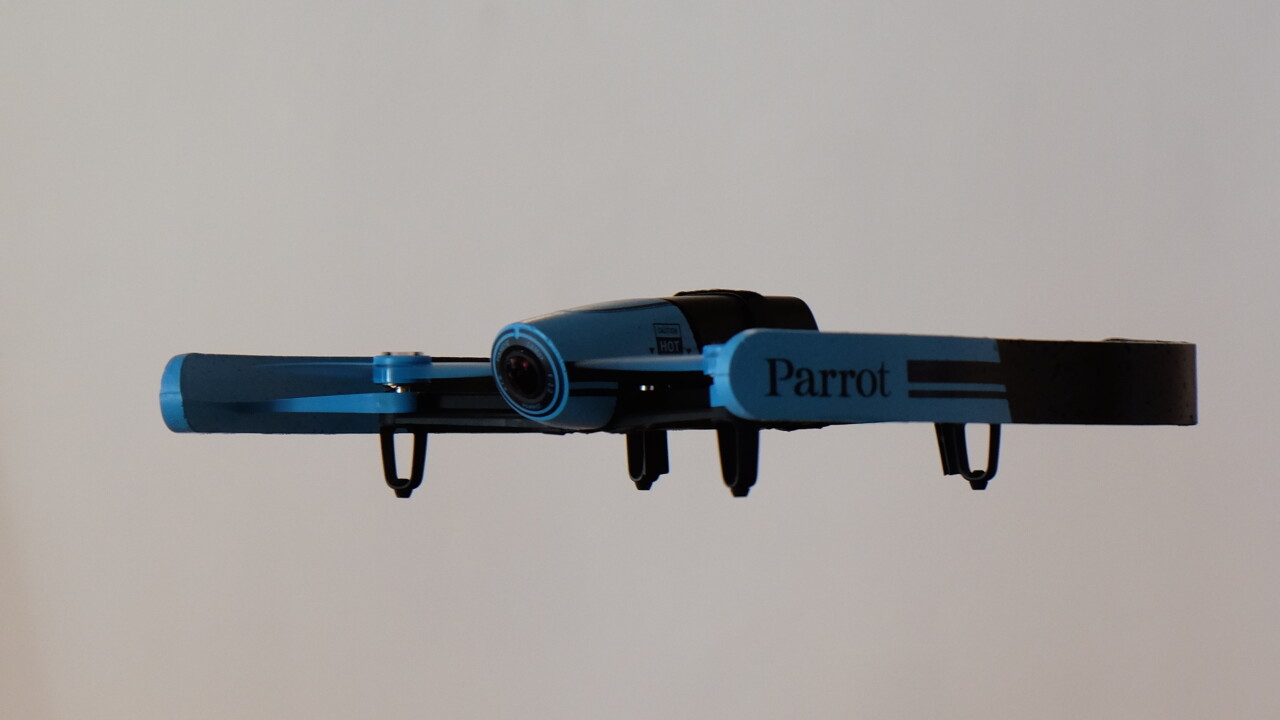
Earlier this week, Parrot announced its latest drone, the Bebop, and the Android-based Skycontroller remote. Here are our impressions from our brief flight time with the gadget, which goes on sale in early December.
Parrot is probably best known for its AR.Drone quadcopter. While the the device has been one of the best-selling drones on the market, it has remained on the low-end of the market while companies like DJI take over the mid- to high-end.
Bebop costs $499 as a standalone device and $899 with the Skycontroller. That’s a sizable jump up from the $399 price of Parrot’s AR.Drone 2.0.
“This is not a toy. This is a flying camera,” Parrot VP Peter George explained in an interview.

George added that Parrot has focused on making fun drones up until now, but the Bebop takes the company a step further with its focus on aerial photography. Parrot has equipped the device with a 1080p, 14MP HD camera that offers a 180-degree field of view, both horizontally and vertically.
The actual video recording on the Bebop won’t capture the full 180-degree view, but you can pan a 16:9 view across the camera from within the app. The wide-angle camera allows Bebop to forego the complicated multi-axis gimbal setup required for most action camera drones. Parrot uses software stitching in order to avoid excessive curvature from the lens.
Flying the Bebop is a similar experience to Parrot’s entry-level Rolling Spider Minidrone, which I’ve been testing. You’ll have a few more control options with the Bebop, but the basic control scheme places elevation and rotation on the left virtual stick and uses accelerometer tilt controls for moving forward, backward and side to side.
The test units experienced some motor problems while flying, but nothing particularly major. Parrot’s flight controls are definitely suitable for beginners, but you should practice in an open space before you start cruising inside near your porcelain collection.
The Bebop creates a WiFi network that you’ll need to connect to when piloting. From an iOS and Android device, you’ll have up to 300 meters of distance for the drone. The Skycontroller lets you fly up to 1.25 miles away. Still, I can’t really imagine flying the drone that far, as it’d be impossible to see and steer with your own eyes by then.
Bebop uses a 3-axis gyro to stabilize and includes rubber cushioning for the camera. The device also uses software image stabilization in order to keep the frame steady as it records. Bebop comes with 8GB of onboard memory, enough to record four full flights. A software update will also allow you to plug a USB stick in the back for additional memory.
Parrot claims that the Bebop will have 11 minutes of flight time per charge. The drone comes with two batteries in a box, and packs charge fully in about 90 minutes. Drones are notorious for struggling with battery life, so Bebop’s numbers match other similarly-priced vehicles. Most consumers probably have unrealistic expectations about battery life, so new pilots may find themselves disappointed.
If you’re running low on battery, you can hit a fly home button in order to use GPS to guide the drone back to you. In the near future, Parrot also plans to add waypoint flying to the devices so that you can program a pre-determined flight plan for the Bebop.
In terms of sturdiness, all of the parts on the Bebop survived multiple crashes while a group of us were testing the gadget. The gadget comes with foam guards for indoor flying. If you do end up breaking a piece, you can purchase a replacement online.
George noted that Bebop is designed to appeal to the masses, while having a camera good enough for enthusiasts to appreciate. I’m skeptical whether the image quality will beat DJI’s Phantom 2 Vision+ or a newer GoPro, but you can view a sample gallery of photos here.
My favorite feature of the Bebop is the Skycontroller’s compatibility with first-person view glasses. You can plug the Sony FPV glasses, Zeiss Cinemizer and eventually the Oculus into the controller for an immersive flying experience. You’ll look like a cyborg while doing it, but it’s totally worth it.
I’ve had a bit of drone fever lately, and the Bebop almost convinces me to buy one. I might still end up springing for a more expensive device like the DJI Phantom 2, but the Bebop offers a good balance of image quality, price and ease of use.
If you’re just starting out as a pilot, I recommend you pick up the $99 Parrot Rolling Spider to get used to the controls. When you’re ready to graduate to something bigger and better, the Bebop is a solid option.
Get the TNW newsletter
Get the most important tech news in your inbox each week.






